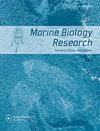New records and observations of marine algae from Morocco (Eastern Atlantic Ocean)
IF 1.2
4区 生物学
Q4 ECOLOGY
引用次数: 0
Abstract
ABSTRACT In the present paper, three algal species are recorded for the first time from Morocco: the two red algae Antithamnion villosum and Antithamnionella ternifolia and the green alga Lychaete rhodolithicola. Furthermore, two other red algae species are recorded for the first time from the Moroccan Atlantic coast and this part of the eastern Atlantic Ocean: Antithamnion amphigeneum and Antithamnionella boergesenii. Descriptions of these newly reported species are provided accompanied by photographs for each species. In addition, new observations and taxonomic remarks for some species are also provided. The green alga Lychaete rhodolithicola has a limited distribution in the North-eastern Atlantic Ocean of Europe, and the report of this species from Morocco extends the distribution of this species, because it is the first record of this species in Africa and outside Europe. This is one of the rare documentations with description and illustrations of L. rhodolithicola. The foliose species Grateloupia turuturu is studied in detail; it has been widely misidentified as G. doryphora. An examination of all specimens going under the name G. doryphora in the Moroccan herbaria has determined these specimens to be Grateloupia turuturu. An identification key for all Moroccan species of Antithamnion, Antithamnionella and Lychaete is presented.摩洛哥(东大西洋)海藻新记录与观测
本文首次在摩洛哥记录到三种藻类:两种红藻Antithamnion villosum和Antithamnionella ternifolia,以及绿藻Lychaete rhodolithicola。此外,在摩洛哥大西洋沿岸和大西洋东部的这部分地区首次记录到另外两种红藻:Antithamnion amphigeneum和Antithamnionella boergesenii。这些新报告的物种的描述附有每个物种的照片。此外,还提供了一些物种的新观察和分类注释。绿藻Lychaete rhodolithicola在欧洲东北大西洋的分布有限,摩洛哥的报告扩大了该物种的分布范围,因为这是该物种在非洲和欧洲以外的第一次记录。这是一份罕见的描述和插图的文献。详细研究了毛叶植物格莱卢皮亚(Grateloupia turuturu);它被广泛地误认为是G. doryphora。对摩洛哥植物标本室中所有以G. doryphora命名的标本进行检查后,确定这些标本为Grateloupia turuturu。对所有摩洛哥种的Antithamnion、Antithamnionella和Lychaete进行了鉴定。
本文章由计算机程序翻译,如有差异,请以英文原文为准。
求助全文
约1分钟内获得全文
求助全文
来源期刊

Marine Biology Research
生物-海洋与淡水生物学
CiteScore
2.10
自引率
0.00%
发文量
55
审稿时长
6-12 weeks
期刊介绍:
Marine Biology Research (MBRJ) provides a worldwide forum for key information, ideas and discussion on all areas of marine biology and biological oceanography. Founded in 2005 as a merger of two Scandinavian journals, Sarsia and Ophelia, MBRJ is based today at the Institute of Marine Research, Bergen, Norway. The Journal’s scope encompasses basic and applied research from all oceans and marine habitats and on all marine organisms, the main criterium for acceptance being quality.
 求助内容:
求助内容: 应助结果提醒方式:
应助结果提醒方式:


